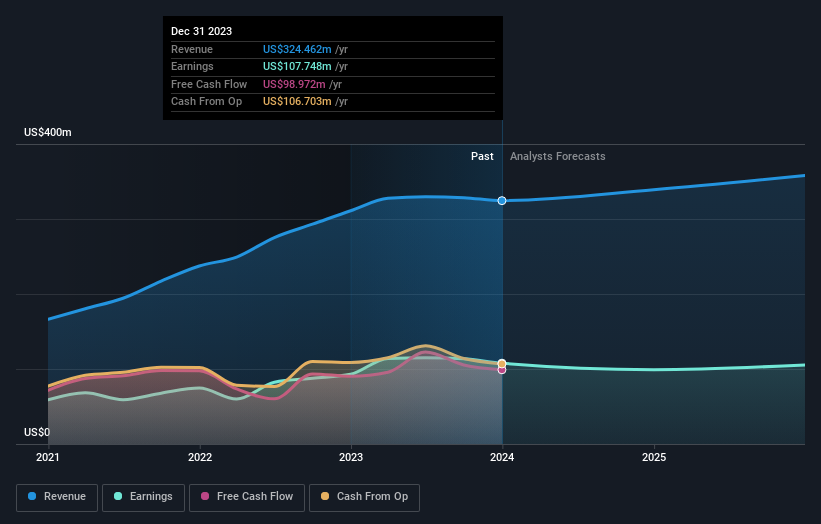Institutional investors may adopt severe steps after Stock Yards Bancorp, Inc.'s (NASDAQ:SYBT) latest 5.2% drop adds to a year losses
Key Insights
Given the large stake in the stock by institutions, Stock Yards Bancorp's stock price might be vulnerable to their trading decisions
51% of the business is held by the top 18 shareholders
A look at the shareholders of Stock Yards Bancorp, Inc. (NASDAQ:SYBT) can tell us which group is most powerful. We can see that institutions own the lion's share in the company with 58% ownership. Put another way, the group faces the maximum upside potential (or downside risk).
And so it follows that institutional investors was the group most impacted after the company's market cap fell to US$1.4b last week after a 5.2% drop in the share price. This set of investors may especially be concerned about the current loss, which adds to a one-year loss of 13% for shareholders. Institutions or "liquidity providers" control large sums of money and therefore, these types of investors usually have a lot of influence over stock price movements. Hence, if weakness in Stock Yards Bancorp's share price continues, institutional investors may feel compelled to sell the stock, which might not be ideal for individual investors.
Let's delve deeper into each type of owner of Stock Yards Bancorp, beginning with the chart below.
Check out our latest analysis for Stock Yards Bancorp
What Does The Institutional Ownership Tell Us About Stock Yards Bancorp?
Institutional investors commonly compare their own returns to the returns of a commonly followed index. So they generally do consider buying larger companies that are included in the relevant benchmark index.
Stock Yards Bancorp already has institutions on the share registry. Indeed, they own a respectable stake in the company. This can indicate that the company has a certain degree of credibility in the investment community. However, it is best to be wary of relying on the supposed validation that comes with institutional investors. They too, get it wrong sometimes. When multiple institutions own a stock, there's always a risk that they are in a 'crowded trade'. When such a trade goes wrong, multiple parties may compete to sell stock fast. This risk is higher in a company without a history of growth. You can see Stock Yards Bancorp's historic earnings and revenue below, but keep in mind there's always more to the story.
Since institutional investors own more than half the issued stock, the board will likely have to pay attention to their preferences. We note that hedge funds don't have a meaningful investment in Stock Yards Bancorp. BlackRock, Inc. is currently the company's largest shareholder with 7.0% of shares outstanding. With 6.1% and 5.2% of the shares outstanding respectively, The Vanguard Group, Inc. and Stock Yards Bank & Trust Co Inc, Asset Management Arm are the second and third largest shareholders.
After doing some more digging, we found that the top 18 have the combined ownership of 51% in the company, suggesting that no single shareholder has significant control over the company.
While it makes sense to study institutional ownership data for a company, it also makes sense to study analyst sentiments to know which way the wind is blowing. There are a reasonable number of analysts covering the stock, so it might be useful to find out their aggregate view on the future.
Insider Ownership Of Stock Yards Bancorp
While the precise definition of an insider can be subjective, almost everyone considers board members to be insiders. Management ultimately answers to the board. However, it is not uncommon for managers to be executive board members, especially if they are a founder or the CEO.
I generally consider insider ownership to be a good thing. However, on some occasions it makes it more difficult for other shareholders to hold the board accountable for decisions.
We can report that insiders do own shares in Stock Yards Bancorp, Inc.. This is a big company, so it is good to see this level of alignment. Insiders own US$114m worth of shares (at current prices). It is good to see this level of investment by insiders. You can check here to see if those insiders have been buying recently.
General Public Ownership
With a 34% ownership, the general public, mostly comprising of individual investors, have some degree of sway over Stock Yards Bancorp. While this group can't necessarily call the shots, it can certainly have a real influence on how the company is run.
Next Steps:
I find it very interesting to look at who exactly owns a company. But to truly gain insight, we need to consider other information, too. Consider risks, for instance. Every company has them, and we've spotted 1 warning sign for Stock Yards Bancorp you should know about.
Ultimately the future is most important. You can access this free report on analyst forecasts for the company.
NB: Figures in this article are calculated using data from the last twelve months, which refer to the 12-month period ending on the last date of the month the financial statement is dated. This may not be consistent with full year annual report figures.
Have feedback on this article? Concerned about the content? Get in touch with us directly. Alternatively, email editorial-team (at) simplywallst.com.
This article by Simply Wall St is general in nature. We provide commentary based on historical data and analyst forecasts only using an unbiased methodology and our articles are not intended to be financial advice. It does not constitute a recommendation to buy or sell any stock, and does not take account of your objectives, or your financial situation. We aim to bring you long-term focused analysis driven by fundamental data. Note that our analysis may not factor in the latest price-sensitive company announcements or qualitative material. Simply Wall St has no position in any stocks mentioned.

 Yahoo Finance
Yahoo Finance 

